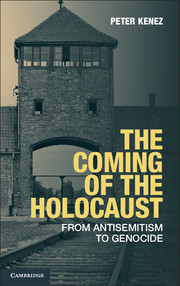Book contents
- Frontmatter
- Contents
- Acknowledgments
- Introduction
- Part one The Rise of Modern Antisemitism
- Part two The National Socialists Take Control of the German State Machinery
- Part three War
- 7 Ghettos in Poland, 1939–1941
- 8 The Holocaust in the Soviet Union
- 9 The Romanian Holocaust
- 10 Germany, 1942
- 11 The Holocaust in Western Europe
- 12 The Last Island
- 13 Extermination Camps
- 14 Afterthoughts
- Bibliography
- Index
14 - Afterthoughts
Published online by Cambridge University Press: 05 June 2014
- Frontmatter
- Contents
- Acknowledgments
- Introduction
- Part one The Rise of Modern Antisemitism
- Part two The National Socialists Take Control of the German State Machinery
- Part three War
- 7 Ghettos in Poland, 1939–1941
- 8 The Holocaust in the Soviet Union
- 9 The Romanian Holocaust
- 10 Germany, 1942
- 11 The Holocaust in Western Europe
- 12 The Last Island
- 13 Extermination Camps
- 14 Afterthoughts
- Bibliography
- Index
Summary
In searching for an understanding of the Holocaust, we must begin by looking at the nature and consequences of antisemitism. This particular prejudice has an extremely long history. It is multifaceted: Not all antisemites think the same way and have the same concerns, and their beliefs do not have the same consequences. The genteel antisemitism of a British lord, who saw Jews as parvenus and associated them with traits for which he had only contempt, was profoundly different from that of the poor Ukrainian peasant who wrongly thought of the Jew as his exploiter. A French writer who depicted Jews in an unfavorable light did not necessarily have much in common with a Nazi storm trooper. Pious Christians who resented Jews because they considered them responsible for the death of their savior had different concerns than did the small business owners who saw Jews as unfair competitors. With the coming of the modern age, which is coterminous with the French Revolution, the position of Jews profoundly changed, and with it the nature of antisemitism. In the new world Jews came to be not only despised but above all feared.
The antisemitism that drove the Nazis had little to do with genteel contempt or church-inspired antisemitism. Instead the Nazis placed at the center of their ideology an overwhelming fear of Jewish world domination. Hitler and his followers managed to connect everything that they disliked and feared in the modern world to Jews. Their worldview demanded an enemy, and no group could have played that role as well as Jews. It is a sad irony that the age of extraordinary Jewish accomplishments in the fields of arts, science, commerce, and finances in the Western world coincided with the Holocaust. Jewish achievements and the great tragedy of the Holocaust are two sides of the same coin.
- Type
- Chapter
- Information
- The Coming of the HolocaustFrom Antisemitism to Genocide, pp. 289 - 294Publisher: Cambridge University PressPrint publication year: 2013



